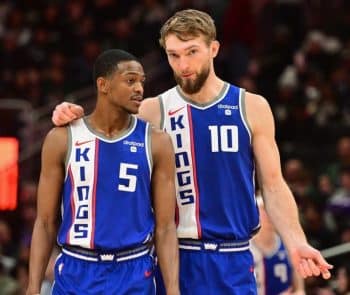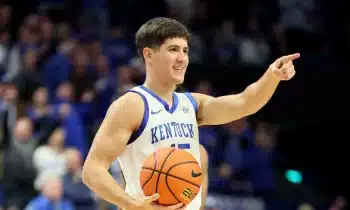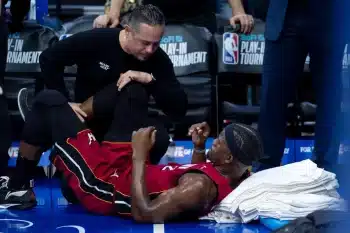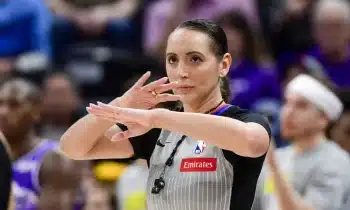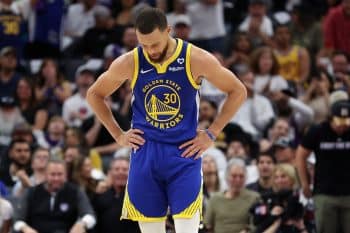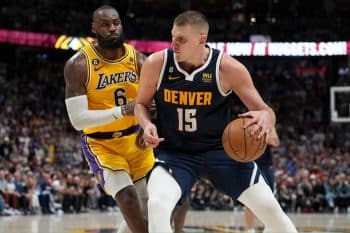NBA
NBA AM: Is It Time To Move Reggie Jackson?

The Curious Case Of Reggie Jackson: When the Cleveland Cavaliers decided to consummate the three-team deal that landed them J.R. Smith and Iman Shumpert from New York, the news of the deal trickled out slowly with NBA new guru Adrian Wojnarowski tweeting out the details as they were trickling to him. As is common, everyone else sort of piggybacked off of Woj’s tweets.
The problem there is that Woj tweeted that the deal included Thunder guard Reggie Jackson, and virtually everyone else began reporting that Jackson was in the deal and headed to the Knicks.
Woj is rarely wrong on trades and trade details, so why wouldn’t everyone assume he was on the money, right? Well he wasn’t and that happens in real-time reporting.
The by-product of that is this new assumption that the Thunder are looking to move Jackson because of his pending free agency. The arrival of Dion Waiters hasn’t hurt that idea either, mainly because the Thunder are trying to work Waiters into their process and that’s meant less minutes for Jackson and more speculation that Jackson is the odd man out and going to be traded.
Jackson has heard the rumors and trying not to add fire to them.
“I mean, that’s what everybody’s saying,” Jackson said to Darnell Mayberry of The Oklahoman. “I’m not here to speculate, though. So if that’s what they do I understand it’s a business. If not, I’m still out here giving it my all. I’m just here to enjoy the game to the best of my ability. That’s all I want to do is play basketball.”
Jackson tried to paint the picture that the trade talks aren’t affecting him, although his minutes and production has dropped since the trade, with more minutes swinging to guards Andre Roberson and Waiters. Jackson says he’s handling the trade talk well.
“Probably better than you are. Y’all are bringing it up,” Jackson said. “I can’t control it. I just go play whenever I’m put on the court. That’s about all I can do, all the control I have. Just go from there. I’m happy (Waiters) did well. I’m happy he made a big shot. I’m just happy we got a win.”
Jackson said he’s just trying to focus on improving his own game.
“I wish I could do better,” Jackson said, “but I’m just trying to make the most that I can out of the minutes that I’m getting.”
The popular narrative is the Thunder “can’t afford to pay Jackson” this summer if they want to remain under the luxury tax, and that might be true if Jackson receives a top range free agent offer.
Hornets guard Kemba Walker signed a four-year, $48 million extension in October, which likely set the bar on free agent point guards at roughly $12 million a year on the high side.
That’s a big number for the Thunder who have $68.707 million in hard salary cap commitments next season. They will also have to account for the arrival of 2014 draft pick Josh Huestis, who they have stashed in the D-League. Huestis will cost them just under $1 million. They have their own draft pick if it falls in the top 18, so there is a place holder for that to the tune of about $1 million and a couple of second rounders.
So for the sake of discussion let’s call the Thunder’s cap for next season $70.707 million. Early projections from the NBA peg the 2015 salary cap at roughly $66.3 million with a luxury tax line of just at $80 million, giving the Thunder roughly $9.3 million in space under the tax line.
They can free up more if they trade away guys like Jeremy Lamb ($3.03 million in 2015) or Perry Jones ($2.03 million in 2015) – neither decision has to be made until the trade deadline next year, but they have options to reduce cost.
So the idea that the Thunder can’t pay Jackson is a little misplaced, because they can. It becomes expensive if another team puts a $12 million offer on the table, which is surely what Jackson’s agent is going to seek in July, even if it’s a shorter term deal simply to get that first year as high as possible to force the Thunder’s hand.
With the salary cap looking to balloon in 2016, this isn’t nearly the problem it’s made to be, but that is the popular narrative.
The truth lies somewhere in the middle of that.
Some of that is the Thunder and their mindset, some of that is Jackson and his mindset.
The Thunder have a starting point guard. His name is Russell Westbrook and he is one of the best players at his position. As much as it seems to make sense to slide him over to the two guard spot, the Thunder do not see that as workable for them, meaning Jackson is the sixth man on his best day.
Here is the problem: Jackson doesn’t want to be the sixth man. He wants to start, as most players do. The idea of spending his career from the bench isn’t overly appealing and he has become a little pouty about it.
The Thunder saw an opportunity to grab Waiters for basically nothing in their part of the three-team deal with the Cavaliers, because they saw Waiters as more of a natural sixth man player and that’s has marginalized Jackson even more.
The problem with Jackson and the Thunder is not financial. That surely plays a small role, but it is really philosophical.
They have a clearly defined role they want Jackson to play and they would pay him well to play it.
He doesn’t want that role or the salary that the Thunder have ear marked for it. He wants a better role, and with that a better paycheck.
The narrative is the Thunder won’t pay him. That’s not really the case, the Thunder don’t need Jackson to start. They know full well he can, but that’s not a need they want to fill.
The arrival of Waiters gives the Thunder options. One of those options is to trade Jackson, which they very well may do.
But much like James Harden in 2012, this won’t be nearly as much about money as the role the player wants to play versus the role that the Thunder have for him.
Money is always a factor, but the Thunder can pay Jackson and still avoid the luxury tax if they really wanted to. The problem is paying a guy what could be $12 million a year to be the sixth man isn’t necessarily smart for a small market team. Paying a guy at the top end of his position to play from the bench isn’t smart either.
If Jackson goes, and he very well might, it’s going to be because he is not the player they need him to be. The money part just makes it easier to justify.
That’s not nearly as sexy a narrative as “they can’t pay him”; they can, they just may not want to with where things are in the relationship.
Jimmy Butler And The Bulls: Is he worth the max yet? In October the Chicago Bulls and Jimmy Butler met to hash out terms of a contract extension. Typical to how the Bulls handle things, they locked in on an $11 million per year price. That number worked up from about $9 million a year when the process started.
Butler considered the offer carefully as he really wanted to stay in Chicago. As the deadline ticked closer there was a sense that maybe Butler would cave a little and take the bird in the hand if the Bulls came up just a little. However, something stuck in his mind: was he being valued based on what he did last year or what he could be going forward?
At one point he asked the Bulls if they thought he’d shoot as badly as he did last year? It was more rhetorical, but it set the tone for how things went all the way to deadline, where he ultimately decided to “gamble on himself”.
Butler endured a nasty case of turf toe last year, and played through it all year, grinding out major minutes on a bad foot. He knew he needed to play in order to get a contract, so typical for Butler he just grinded it out. He had trouble getting proper lift on his shot. His body hurt a lot, so he didn’t by his own admission post great numbers.
He knew his could handle the grind better this season and believed he could post better numbers. His agents gave him the lay of the land too.
There are as many as 15 NBA teams that’s could have $15 million or more in cap space to play with and that’s including teams looking for a tent pole player like the Knicks and the Lakers.
So Butler declined the extension and rolled the dice.
So far it’s paying off in a huge way.
As of last night Butler is scoring 20.6 points per game on 46.4 percent field goal shooting (3rd best on the team). He is kicking in 34.2 percent from the three-point line and leads the team in steals. Butler is posting the teams second best PER at 21.3, just a nose behind Pau Gasol who is posting a solid 22.6 PER.
It is likely that Butler, who was drafted with the 30th pick in the 2011 Draft, will be added to the 2015 NBA All-Star team, likely as a reserve.
The gamble seems to be paying off.
There have been reports that the Bulls want to take a proactive approach to Butler this summer and deliver a full max offer to him on July 1 before any other teams can get in front of him.
Here is the problem for Chicago: Butler is going to set the terms.
He wants to remain in Chicago and a max salary is going to be required, but what is also going to be required is options.
Butler is going to want the chance to re-set his contract under the new ballooning salary cap. He is also going to want a trade kicker, and he’ll want his contract structured in a way that makes him really hard or highly unfavorable to trade.
The Bulls and Butler will likely make a deal this summer. Both sides want that. What has changed is Butler is now in the driver’s seat on what that deal looks like, mainly because he knew he’d have a better year this year than he did last year.
The funny thing about all of this is had the Bulls moved their offer to $12.5 million a year, Butler might have signed it. Now it’s going to cost a lot more money going forward.
The Sell Off In Denver: When the Nuggets decided to cash out center Timofey Mozgov to the Cleveland Cavaliers in return for two highly protected draft picks, Nuggets general manager Tim Connelly said he doubted his team would be selling off anything else.
That has not stopped teams from calling, sensing there was blood in the water and the Nuggets may be open for business.
The two biggest names being inquired about are Wilson Chandler ($6.75 million) and Arron Afflalo ($7.5 million).
Chandler’s deal is only partially guaranteed for $2 million next year so he could be an interesting rental. Chandler is posting 14.2 points per game on 41.7 percent field goal shooting. Meanwhile Afflalo is kicking in 15.5 points per game on 44.7 percent field goal shooting.
Neither player is playing overly efficient basketball and both seem like they will lose time to a returning Danilo Gallinari, who could see action in the coming weeks after tearing his meniscus recently.
The Nuggets have been listening to offers according to league sources, however they don’t seem overly engaged at this point, but that could change once they see what Gallinari looks like after almost a year and nine months away from basketball.
The Nuggets have been as Jekyll and Hyde as anyone in basketball, stringing together chunks of wins and losses all season. The Nuggets are currently riding a hot streak of four straight wins, but still find themselves three and half games out of the eighth seed in the West and three games below .500.
The 2015 NBA trade deadline is February 19 at 3:00pm EST, so the Nuggets have roughly 37 days to figure out if they are going to compete or if its time to start selling off pieces.
Other teams sense there may be blood in the water, but the Nuggets don’t believe they are dead just yet.
More Twitter: Make sure you are following all of our guys on Twitter to ensure you are getting the very latest from our team: @stevekylerNBA, @AlexKennedyNBA, @LangGreene, @EricPincus, @joelbrigham, @SusanBible @TommyBeer, @JabariDavisNBA , @NateDuncanNBA , @MokeHamilton , @JCameratoNBA, @iamdpick, @jblancartenba, @johnzitzler, @marypazstevens and @YannisNBA.
